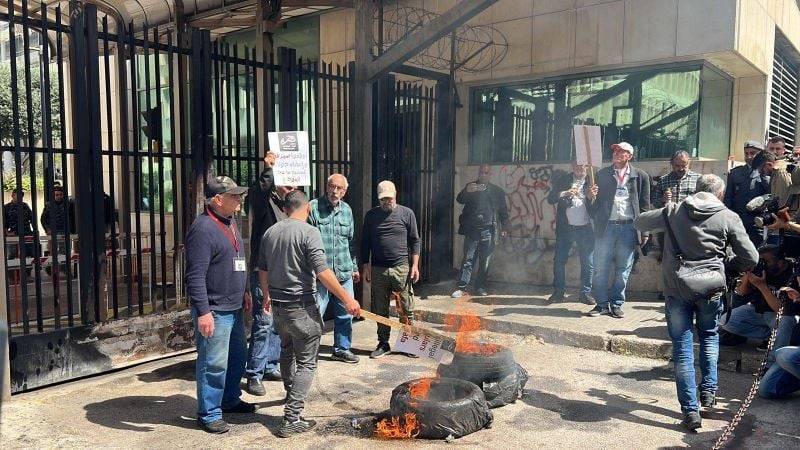
Demonstrators burn tires in front of the Banque du Liban headquarters in Beirut's Hamra neighborhood, March 24, 2023. (Credit: Lyana Alameddine/L'Orient Today)
BEIRUT — Members of the Cry of the Depositors group burnt tires and protested in front of the Banque du Liban headquarters in Beirut Friday morning after a week of wildly fluctuating exchange rates saw the Lebanese lira dip to an all-time low of around LL140,000 to the dollar.
Depositors decry the fact that since Lebanon's financial crisis began in 2019, local commercial banks have imposed illegal restrictions on withdrawals and transfers, without a capital controls law to regulate such measures.
Since then, BDL has put in place a series of measures for depositors, allowing them to withdraw small portions at a time from their savings accounts at various exchange rates much lower than that of the parallel market.
Depositors' organizations have demanded banks return all deposits.
Dozens of protesters gathered in front of the central bank headquarters in Beirut's Hamra neighborhood at around 11 a.m., a L'Orient-Le Jour reporter found. Police and army personnel were also present.
"Riad Salameh is a thief," chanted some of the protesters, referring to BDL's governor. Salameh is accused of having spurred the economic crisis and is the target of corruption and embezzlement probes in Lebanon and abroad.
Floating exchange rate
Some protesters burned tires in front of the central bank's entrance, while others threw fireworks and glass bottles at the building.
"All my life I have saved my salary and in the end, it was taken away from me," said Alice Rizkallah, a 60-year-old teacher who had joined the protest.
Protester Richard Abou Jaoudeh, a financial consultant, called for "recovering the entirety of the savers' deposits and adopting a floating exchange rate."
"No trust in banks until the full return of deposits," read another banner held by two women.
'We can't make ends meet'
Zeina Rida, a 52-year-old mother, explained that she had saved "to prepare for her retirement."
"This money blocked in the banks was supposed to help us survive in our old age, but instead we can't even make ends meet," Rida said.
The protesters later moved on to other banks in the Hamra area and were seen smashing some of their storefronts.
The police and the army cordoned off access to some banks but did not use force.
In front of one bank, a woman was seen crying and overcome with emotion. "Injustice! "Stay strong," another protester called out to her.
Ekram, a protester and former bank employee, lamented the loss of her own savings in Lebanon's banks. "I lived in Canada for 30 years and deposited everything I earned in Lebanese banks. Now I have to beg for my money back," she said.
"I am against violence but we don't know what to do anymore."
The banking restrictions have angered depositors, some of whom have staged bank heists to demand their savings. In response, banks have staged several strikes to urge security measures and, more recently, a law on capital controls.
Attempted break-in
Meanwhile, local resident Pascal al-Rassi and his wife Valerie attempted to enter the home of BLC bank board of directors chairperson Nadim al-Qassar in Jnah, lawyer Rami Ollaik told L'Orient Today.
Ollaik also leads Moutahidoun ("United," in English), a depositors' rights organization.
Ollaik added that the couple tried to break into Qasser's home as a form of protest against the bank's illegal measures — including blocking them out of their deposit, which reportedly amounts to around $100,000.
The couple has said they need the deposit to settle urgent medical fees. They approached Qasser's home peacefully, according to Ollaik, who added that the building's security detail subsequently clashed with them, forcing them to leave the scene.
Last December, Pascal al-Rassi tried to withdraw part of his blocked deposit from a branch of the Lebanese Bank for Commerce (BLC Bank) in Antelias, Metn but left empty-handed.
Since 2019, Lebanon's national currency has depreciated by more than 98 percent compared to the former official exchange rate.
On Tuesday morning, the lira hit a record low of LL143,000 to the dollar on the parallel market. The official rate was recently adjusted to LL15,000 against the dollar, after being pegged at LL1,500 for 25 years.
This all comes as Lebanon stalls on reforms required by the International Monetary Fund in return for a multi-billion-dollar bailout package. But on Thursday IMF officials said the country is in the midst of "a very dangerous moment," and criticized the slow pace of reform.
A protest by depositors and military retirees in downtown Beirut Wednesday escalated after security forces fired tear gas at the crowd.
Additional reporting by Lyana Alameddine